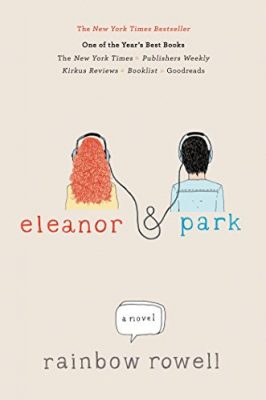
Returning to live with her mother and siblings after a mysterious absence, Eleanor’s first day at her new school begins inauspiciously, when no one will let her sit next to them on the bus. Eventually, Park takes pity on her, and over a series of bus trips they gradually develop a friendship that turns into a romance. But Eleanor’s home life is less than idyllic, and forces beyond their control are building that will threaten to topple their fragile happiness.
This may be the best YA novel I have ever read. The characters are nuanced, the issues are complex, the style is engaging without being unnecessarily overwrought. Eleanor is no manic pixie dream girl – she isn’t even conventionally pretty, and is apparently a little overweight, which is a refreshing change when it comes to teen romance. While the focus of the book is not on body image issues, they are explored, and Rowell has a deft touch, and the compassion of a woman who has come out the other side. Eleanor’s useless biological father only appears once, but his brief scene fills in so much about the background to her family life and character. Even the high school antagonists have unexpected dimensions. Fans of 80s music will enjoy the mix tapes; fans of comics should be aware that the book is set in 1986, and the protagonists read Watchmen as it’s released. So.
Putting aside the theme of domestic violence for a moment, so much of this novel felt like the truth of being a teenager. There are unexpected friendships and moments of grace, coupled with the heightened emotional stakes of puberty and expressed in ways that remain aware of the critical necessity of fitting in. Park’s parents, an All-American muscle-bound veteran and a tiny Korean woman, are beautifully developed as individuals negotiating parenthood of two adolescent sons, one of whom (Park) is dating a weird girl and starting to wear eyeliner. Eleanor’s reactions are never stereotypical or even sometimes expected, but they ring true in terms of how she, as a person, would respond to events. There’s a beautiful, simple, heartbreaking line that I highlighted: “he kept making her feel like it was safe to smile”.
The opening of the novel reveals that things don’t end well for the titular couple, and the reason is Eleanor’s step-father, a domestic abuser who is not unaware that puberty has struck in his household. Eleanor’s mother is, perhaps, under-written as a victim who can’t see any other way to put food in her kids’ mouths, but perhaps that’s the point: she’s subsumed herself into her husband and is entirely dominated by him. There are reveals along the way about the form that the abuse takes, and I won’t spoil them, but I think Rowell does a great job of creating a story of domestic violence that is both universal in its psychology and specific in its manifestations.
Trigger warnings: domestic violence, sexually explicit verbal abuse.